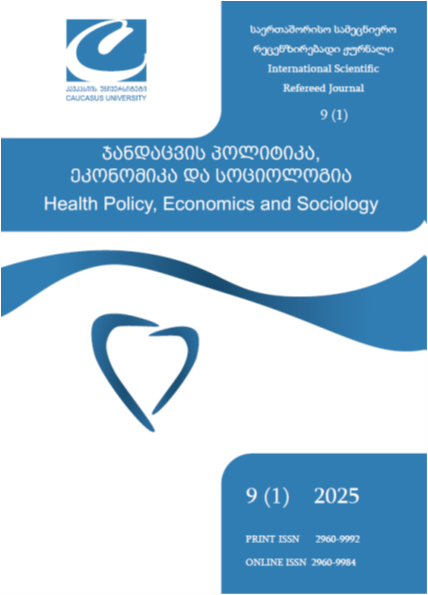ულტრადამუშავებული საკვების მოხმარების გავლენა ადამიანის ნაწლავების ჯანმრთელობაზე
DOI:
https://doi.org/10.52340/healthecosoc.2025.09.01.14საკვანძო სიტყვები:
გასტროენტეროლოგიური დარღვევები, მეტაბოლური სინდრომი, ემულგატორები, დისბიოზი, ქრონიკული ანთება, ნაწლავის მიკრობიოტა, ულტრადამუშავებული საკვებიანოტაცია
შესავალი: ულტრადამუშავებული საკვები პროდუქტები (UPF), რომლებიც ხასიათდება მაღალი რაოდენობით დანამატებით, კონსერვანტებით, დამტკბობლებით და ხელოვნური ინგრედიენტებით, თანამედროვე დიეტის მნიშვნელოვან ნაწილს წარმოადგენს, განსაკუთრებით განვითარებულ ქვეყნებში. მზარდი მტკიცებულებები მიუთითებს იმაზე, რომ ულტრადამუშავებული საკვების რეგულარული მოხმარება უკავშირდება ნაწლავის მიკრობიოტას ცვლილებებს, ნაწლავის განვლადობის ზრდას და სისტემურ დაბალინტენსიურ ანთებას — რაც მრავალი ქრონიკული დაავადების, მათ შორის გასტროენტეროლოგიური, კარდიომეტაბოლური და ნეიროფსიქიატრიული დარღვევების გამომწვევი ფაქტორია. მეთოდები: ჩატარდა ყოვლისმომცველი ლიტერატურის მიმოხილვა PubMed-ის, Scopus-ისა და Google Scholar-ის მონაცემთა ბაზებში. განხილული იქნა 2011-2022 წლებში ინგლისურ ენაზე გამოქვეყნებული რეცენზირებული, ღია წვდომის მქონე სტატიები. წინამდებარე მიმოხილვა მოიცავს იმ დაკვირვებითი და კლინიკური კვლევების განხილვას, რომელთა მიზანი იყო გამოვლენილიყო კავშირი ულტრადამუშავებული საკვების მოხმარებასა და ნაწლავის მიკრობიოტას შორის. შედეგები: აღმოჩნდა მკაფიო კავშირი UPF-ის მოხმარებასა და ნაწლავის მიკრობიოტას მრავალფეროვნების შემცირებას შორის, მათ შორის ისეთი სასარგებლო ბაქტერიების რაოდენობის კლება, როგორიცაა Faecalibacterium prausnitzii, Roseburia და Akkermansia muciniphila. ამავე დროს, მატულობდა ანთებითი პროცესების ხელშემწყობი ბაქტერიების რაოდენობა. ემულგატორები, ხელოვნური დამტკბობლები, ნანონაწილაკები და საკვები საღებავები ასუსტებს ნაწლავის ბარიერს, იწვევს დისბიოზს და ხელს უწყობს სისტემურ ანთებას. მაღალი UPF მოხმარება კავშირშია მეტაბოლური სინდრომის, ანთებითი ნაწლავის დაავადებების (IBD) და ფსიქიკური ჯანმრთელობის პრობლემების გავრცელებასთან. დისკუსია: მიღებული შედეგები ხაზს უსვამს UPF-ით გამოწვეულ ნაწლავის დისბიოზისა და ქრონიკული ანთების მჭიდრო კავშირს. მთავარი მექანიზმებია SCFA-ების (მოკლემოლეკულური ცხიმოვანი მჟავები) შემცირებული წარმოება, ნაწლავის ბარიერის დაქვეითება და საკვების შეფუთვაში არსებული ქიმიური ნივთიერებებით (მაგ., ბისფენოლების) გამოწვეული ენდოკრინული დარღვევები. ახალი კვლევები მიუთითებს, რომ მიკრობიოტას დისბალანსი გავლენას ახდენს ტვინის ფუნქციონირებაზე, ამასთანავე UPF-ის მოხმარება ხელს უწყობს კოგნიტურ და ფსიქიურ დარღვებებს. დასკვნა: ულტრადამუშავებული საკვები პროდუქტების მოხმარება მნიშვნელოვან საფრთხეს უქმნის ნაწლავის ჯანმრთელობას, იწვევს მიკრობიოტის დისბალანსს და ზრდის ნაწლავის განვლადობას, რის შედეგადაც ვითარდება სისტემურ ანთებითი პროცესები და ყალიბდება ქრონიკული დაავადებები. საზოგადოებრივი ჯანდაცვის პოლიტიკაში პრიორიტეტად უნდა იქცეს UPF-ის მოხმარების შემცირება განათლების, ეტიკეტირების გაუმჯობესებისა და რეგულაციების გზით. მომავალი კვლევები უნდა კონცენტრირდეს მიზეზშედეგობრივი კავშირების დადგენასა და ნაწლავის მიკრობიოტაზე ორიენტირებული დიეტური ჩარევების განვითარებაზე.
წყაროები
• Whelan, K., Bancil, A.S., Lindsay, J.O., Chassaing, B. (2024). Ultra-processed foods and food additives in gut health and disease. Nat Rev Gastroenterol Hepatol. 21(6):406-427. doi: 10.1038/s41575-024-00893-5. https://kclpure.kcl.ac.uk/ws/portalfiles/portal/250836530/Whelan_OA_PURE.pdf
• Monteiro, C.A. (2009). Nutrition and health. The issue is not food, nor nutrients, so much as processing. Public Health Nutrition. 12(5):729-731. doi:10.1017/S1368980009005291 https://www.cambridge.org/core/journals/public-health-nutrition/article/nutrition-and-health-the-issue-is-not-food-nor-nutrients-so-muchas-processing/0C514FC9DB264538F83D5D34A81BB10A
• Lane, M.M., Gamage, E., Du, S., Ashtree, D.N., McGuinness, A.J., Gauci, S., Baker, P., Lawrence, M., Rebholz, C.M., Srour, B., Touvier, M., Jacka, F.N., O'Neil, A., Segasby, T., Marx, W. (2024). Ultra-processed food exposure and adverse health outcomes: umbrella review of epidemiological meta-analyses. BMJ. 28;384:e077310. doi: 10.1136/bmj-2023-077310. PMID: 38418082; PMCID: PMC10899807. https://pmc.ncbi.nlm.nih.gov/articles/PMC10899807/
• Tristan Asensi, M., Napoletano, A., Sofi, F., & Dinu, M. (2023). Low-grade inflammation and ultra-processed foods consumption: a review. Nutrients, 15(6), 1546. http://pmc.ncbi.nlm.nih.gov/articles/PMC10058108/
• Rondinella, D., Raoul, P. C., Valeriani, E., Venturini, I., Cintoni, M., Severino, A., Galli, F. S., Mora, V., Mele, M. C., Cammarota, G., Gasbarrini, A., Rinninella, E., & Ianiro, G. (2025). The Detrimental Impact of Ultra-Processed Foods on the Human Gut Microbiome and Gut Barrier. Nutrients, 17(5), 859. https://doi.org/10.3390/nu17050859.
• Song Z, Song R, Liu Y, Wu Z, Zhang X. (2023). Effects of ultra-processed foods on the microbiota-gut-brain axis: The bread-and-butter issue. Food Res Int. 167:112730. doi: 10.1016/j.foodres.2023.112730. Epub 2023 Mar 21. PMID: 37087282. https://www.sciencedirect.com/science/article/abs/pii/S0963996923002752?via%3Dihub
• Vitale, M., Costabile, G., Testa, R., D’Abbronzo, G., Nettore, I. C., Macchia, P. E., & Giacco, R. (2024). Ultra-processed foods and human health: a systematic review and meta-analysis of prospective cohort studies. Advances in Nutrition, 15(1), 100121. https://doi.org/10.1016/j.advnut.2023.09.009.
• Brichacek AL, Florkowski M, Abiona E, Frank KM. (2024). Ultra-Processed Foods: A Narrative Review of the Impact on the Human Gut Microbiome and Variations in Classification Methods. Nutrients. 1;16(11):1738. doi: 10.3390/nu16111738. PMID: 38892671; PMCID: PMC11174918. https://pubmed.ncbi.nlm.nih.gov/38892671/
• Harb, A. A., Shechter, A., Koch, P. A., & St-Onge, M. P. (2023). Ultra-processed foods and the development of obesity in adults. European journal of clinical nutrition, 77(6), 619-627. https://pubmed.ncbi.nlm.nih.gov/36280730/
• Vermeulen, S. J., Park, T., Khoury, C. K., & Béné, C. (2020). Changing diets and the transformation of the global food system. Annals of the New York Academy of Sciences, 1478(1), 3-17. https://pmc.ncbi.nlm.nih.gov/articles/PMC7689688/
• Laudisi, F., Stolfi, C., & Monteleone, G. (2019). Impact of food additives on gut homeostasis. Nutrients, 11(10), 2334. https://pmc.ncbi.nlm.nih.gov/articles/PMC6835893/
• Martini, D., Godos, J., Bonaccio, M., Vitaglione, P., & Grosso, G. (2021). Ultra-processed foods and nutritional dietary profile: a meta-analysis of nationally representative samples. Nutrients, 13(10), 3390. https://www.mdpi.com/2072-6643/13/10/3390
• Holder, M. K., Peters, N. V., Whylings, J., Fields, C. T., Gewirtz, A. T., Chassaing, B., & de Vries, G. J. (2019). Dietary emulsifier consumption alters anxiety-like and social-related behaviors in mice in a sex-dependent manner. Scientific Reports, 9(1), 172. https://doi.org/10.1038/s41598-018-36890-3














